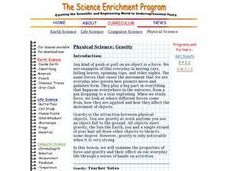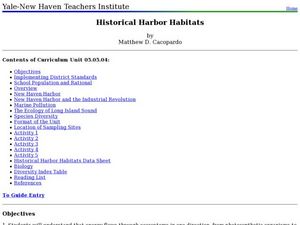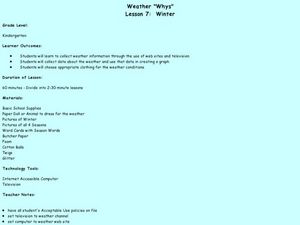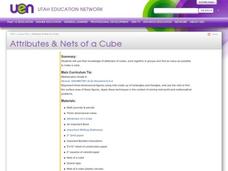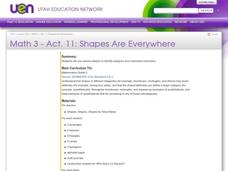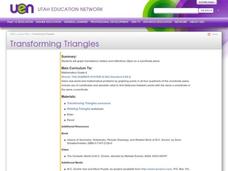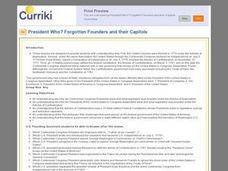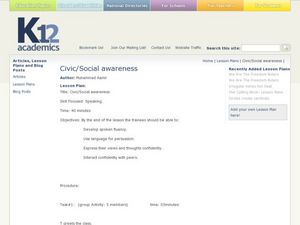Curated OER
Digging for Dirt
Learners examine how trash is removed and evaluate statistics related to trash removal. In this trash removal lesson, students explore the different methods of trash removal and make an original diagram graphing statistical information....
Curated OER
Claiming Common Ground? The Civil War and the Preservation of Claiming Common Ground? The Civil War and the Preservation of George Washington's Mount Vernon
Learners explore how people viewed George Washington in the 19th Century. In this U.S. History lesson, students create a timeline of events during the Civil War, including government and court decisions. Following this activity,...
Curated OER
50th Anniversary of Brown v. Board of Education
Students examine a poster of Brown v. Board of Education and discuss what the important details are. They read the story behind the poster and court case. They role play different sections of the case such as the court case or Linda...
Curated OER
Fertilizers, Pesticides and Human Health
Students define several vocabulary terms related to chemicals and toxicology. Students calculate chemical concentrations in water and explain the toxicological principles that govern safety of substances. Students conduct an...
Curated OER
Global Women and Poverty
Students examine poverty and women in Senegal through a video. They work together to gather research about economic prosperity in different countries. They share their information with the class.
Curated OER
Math: Graphs and Their Symbols
Second graders examine different types of graphs and discover the meanings of the symbols used on them. After gathering data about themselves, their communities, and the world, they use that information to create graphs. Among the...
Curated OER
Physical Science: Gravity
Young scholars investigate the properties of force and gravity and their effects on everyday life. In groups, they test various balls by bouncing them on different surfaces and observe the properties. In another activity, they test...
Curated OER
Historical Harbor Habitats
Tenth graders create food web displays in the classroom. In this ecology lesson, 10th graders identify the different pollutants in the environment and their effect on organisms. They collect samples of sediments from the harbor and...
Curated OER
How to Make a Rock
Second graders watch demonstrations and conduct experiments that show the three different types of rocks: igneous, sedimentary, and metamorphic.
Curated OER
Weather Whys
Second graders experiment with a thermometer and water samples of varying temperatures. They examine the effect different colors and different fabrics have on retaining heat. They examine snow samples for water and dirt content. They...
Curated OER
Parenting Readiness
Students identify parenting styles, including positive guidance techniques that help children develop positive self-concepts, self-management, and responsibility. They emphasize the differences between and the importance of motherhood...
Curated OER
Attributes & Nets of a Cube
Third graders engage in a lesson that focuses on the attributes and forming of a cube. They construct a cube using different combinations while comparing a square with only two-dimensions. Students fold paper while following the...
Curated OER
Shapes Are Everywhere
Third graders use various shapes to identify polygons and understand symmetry. They explore pattern blocks noticing their similarities and differences, then share with other team members. They draw 3 polygons in their journals and...
Curated OER
Classroom Ethics/Means & Ends
Students explore different aspects of ethics. In this ethics lesson plan, students ponder the idea of ethics, and the concepts of the ends and means and action justification. Students will write a reflective paper after a class discussion.
Curated OER
"All Men Are Created Equal"
Students identify the premise of the United States' Democracy. They list the major elements of the document. Students reflect on the inequalities of the late 1700's premise of other units. They complete a KWL chart about the Declaration...
Curated OER
Food Pyramid and Dietary Guidelines
Students examine Food Guide Pyramid and Dietary Guidelines. They look at samples of serving sizes, sort different foods into their correct groups, complete worksheets to discover which types of foods they eat regularly, and discuss...
Curated OER
Transforming Triangles
Sixth graders graph translations (slides) and reflections (flips) on a coordinate plane. They visualize and identify geometric shapes after applying transformations on a coordinate plane. Finally, 6th graders write a paragraph telling...
Curated OER
Food Comparison PDF
In this health worksheet, students are led through lessons to become familiar with the dietary recommendations of the government.
Curated OER
President Who? Forgotten Founders and Their Capitols
Students explore the beginning of the United Colonies that were formed in 1774. In this history lesson, students discuss the Articles of Confederation and then answer questions about the events surrounding the development of the colonies.
Curated OER
Pets and People
Young scholars discuss the pros and cons of having household pets. In this health instructional activity, students identify different types of diseases they can get from pets. They evaluate their pet interactions and suggest ways to...
Curated OER
Civic/Social Awareness
Develop spoken fluency, persuasive speaking skills, and confidence by having your class practice their public speaking skills. They compose and deliver persuasive speeches as they participate in five different speech tasks. A...
Curated OER
"An Eye For An Eye, A Tooth For A Tooth"
Sixth graders debate their reactions to two different historical documents about managing a society. In this U.S. history lesson, 6th graders read two articles on codes and laws from different time periods and debate their thoughts.
Curated OER
Current Spanish History 1900-present
Tenth graders study the Spanish Civil War. In this World History instructional activity, 10th graders analyze famous paintings. Students compare and contrast the government of the United States with that of Spain.
National Endowment for the Humanities
George Washington: The Precedent President
Everyone knows that George Washington was the first president, but do your scholars know why that was so important? The lesson plan, the third in a sequence of three, allows learners to understand how George Washington set a precedent...








